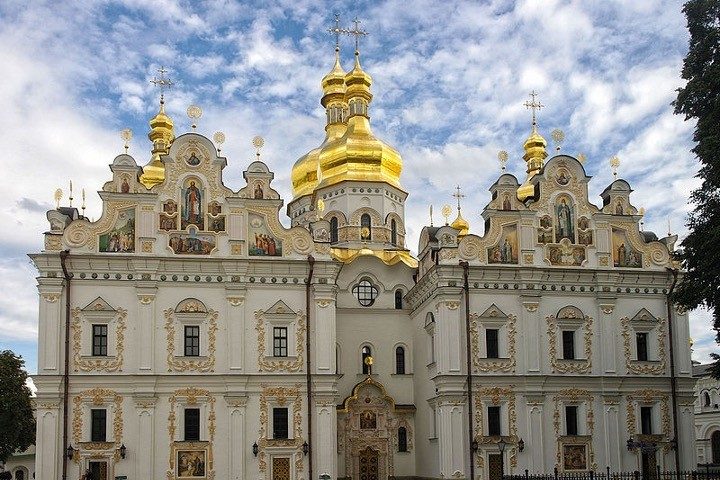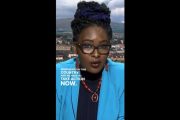
SINGAPORE — On March 30, clerics of the Ukrainian Orthodox Church (UOC) who were ordered to leave the Kyiv-Pechersk Lavra in the Ukrainian capital of Kyiv barred officials from Ukraine’s Culture Ministry and journalists from entering the historic Orthodox Christian monastery. Subsequently, on April 1, according to a report by The Gateway Pundit, Ukrainian security forces bombarded the monastery and forced its vicegerent, Metropolitan Pavel, to sign a search warrant. Later, the authorities took Pavel into custody and then placed him under house arrest.
In a video address on Friday, March 31, prior to Saturday’s government raids, Metropolitan Pavel had expressed fears that the government would assault the monastery as early as Friday evening, stating, “We have just learned of their plans … to launch a smash-and-grab attack on the Lavra. Our people have overheard these men talking on the phone as they plotted the attack.”
The past couple of days had witnessed clashes between members of the UOC and journalists outside the 11th-century monastery when clerics attempted to shield Metropolitan Pavel from pro-Ukraine reporters who were at the monastery to cover the disputes between the clergy and the Kyiv authorities.
Earlier in March, the Kyiv regime’s thugs unilaterally terminated the UOC’s lease at the premises as of March 29, and forcibly expelled the monks from the monastery. Ukrainian Culture Minister Oleksandr Tkachenko had earlier said the UOC monks could stay if they joined the state-sanctioned Orthodox Church of Ukraine, or OCU. Metropolitan Pavel rebuffed Tkachenko’s notion, stating that no compromises would be made.
After raiding the monastery, the godless Kyiv authorities searched Metropolitan Pavel’s home and got a Ukrainian court to put him under house arrest for two months, prohibiting him from communicating with believers and forcing him to wear an ankle bracelet for surveillance purposes. Also, according to a statement from the UOC, the court forcefully sent Pavel to a court hearing on the same day.
Kyiv prosecutors alleged that, beginning February 24, 2022, as the vicegerent of the Kyiv-Pechersk Lavra, Metropolitan Pavel had “decided to justify the aggression of the Russian Federation” with interactions with parishioners of the monastery.
The Security Service of Ukraine (SBU) confirmed Pavel’s charge under two articles of the criminal code, particularly for alleged “violation of citizens’ equality based on their race, nationality or religious preferences” and “justification, recognition as legitimate, denial of the armed aggression of the Russian Federation against Ukraine, glorification of its participants.” Moreover, the Kyiv authorities claimed that the vicegerent’s criticisms of the UOC had led to inter-religious hatred.
Metropolitan Pavel said he had been interrogated by the Ukrainian authorities over his purported ties with Russia.
Based on reports by Russia’s TASS state news agency, the Ukrainian authorities sent Metropolitan Pavel to live in a village some 25 miles southeast of Kyiv during the time of his house arrest, and refused to let him attend church services. Although the patriarch could record videos addressing believers, prosecutors tried to forbid him from doing so.
Pavel declared that the house he was confined to was not fit for habitation. “There is nothing to sleep on, no heat and no light. There is no kitchen, no spoon. But it’s OK, I’ll endure it all,” he stated.
Meanwhile, the spokesman for the Russian Orthodox Church, Vladimir Legoyda, denounced Metropolitan Pavel’s house arrest, saying it had been issued under false accusations and reflected another instance of lawlessness under the tyrannical regime of Volodymyr Zelensky. “The placement of Metropolitan Pavel under house arrest on far-fetched accusations is, alas, a natural continuation of the lawlessness being exercised today by the Ukrainian authorities. Such is the ‘dialogue’ with representatives of the largest Christian denomination in Ukraine,” he said.
In an interview with Sputnik News, Legoyda said that while Zelensky and his sycophants were generally clueless about religion, he believed their globalist U.S. backers influenced them to foment religious divides between Russians and Ukrainians:
I can say that this situation with the Zelensky regime and the Ukrainian Orthodox Church changed last November. Before that, for Zelensky and for his circle, the situation with the Ukrainian Orthodox Church was maybe not that important, or at least they wouldn’t show that it was important because it was the idea of the ex-president Poroshenko to build this new national church. Zelensky was sort of trying to distance [himself] a little bit. So it’s like it’s not my thing. It was Poroshenko who was doing this, it’s not mine. But something changed last November, when this suppression and the pressure from the state became really very strong. And Kyiv-Pechersk Lavra is sort of the final point because there were a lot of other monasteries and churches and priests who were arrested and so on. So it is now for Zelensky some kind of a very important thing that he is trying to do something about. And I’m pretty sure that it has to do with his American consultants.
Evidently, the Zelensky government’s persecution of the UOC has been a grave breach of religious rights, despite its pretensions of championing democracy.
“If you claim to be democratic, you cannot support such actions,” continued Legoyda:
You cannot do what you are doing now in Ukraine. There were facts and situations when priests, Ukrainian Orthodox priests, were arrested for having a postcard from Russia, like a Christmas card, that it was some kind of Russian propaganda. It sounds, you know, absurd. It sounds funny, but it’s not funny at all because people are suffering for this. And it is all those terrible facts and hundreds of those facts; we try to attract the attention of international political organizations to all those terrible facts, to this violation of human rights. No reaction whatsoever.
In a March 28 statement slamming the Zelensky regime’s “pressures, violence and persecutions” of the UOC, the primate of the Serbian Orthodox Church, Patriarch Porphyry, declared that the UOC is “the only canonical and legal Orthodox Church in Ukraine,” being “recognized by all Orthodox Churches in the world,” while the OCU, “recognized by only four,” is a mere “non-canonical schismatic structure” that “can become a Church only through repentance and canonical procedure, never by the stroke of someone’s pen.”
Russian Foreign Ministry spokeswoman Maria Zakharova said that Kyiv has been sneering at and deriding Orthodoxy, while the West has remained mum about such actions.
On her Telegram channel on April 1, Zakharova said that April Fools’ Day was conducted “with great fanfare in Kyiv,” elaborating that “[Ukrainian President Volodymyr] Zelensky, the court and the crowd — all of them are raging during Great Lent.” The Russian official stated: “Orthodoxy is being abused, mocked and sneered at before our eyes. The civilized remain silent. That’s not the occasion for which they wrote human rights declarations and reports on religious freedom. There will be better occasions, conferences or symposiums. There they will talk about lofty things.”
Since the onset of the Russo-Ukraine military conflict in February 2022, the oppressive Kyiv regime has attempted to suppress the UOC due to its historic links to the Russian Orthodox Church, whose leader, Patriarch Kirill, backed Russian President Vladimir Putin in the invasion of Ukraine. In January, authorities submitted a bill to parliament trying to bar the UOC in Ukraine if the courts could prove the church’s links to Russia.
However, the UOC has displayed its loyalty to Ukraine, even slamming Russia’s actions in Ukraine and declaring its independence from Moscow.
A March 28 report with various photographic evidence showed how UOC clergy and believers supplied huge amounts of food, medicines, and medical devices to military personnel, regional hospitals, and displaced people. The Kyiv diocese of the UOC also published another video proving that it offered humanitarian aid to three units of the Ukrainian Armed Forces in the Bakhmut region.
Observers have pointed out that passing the UOC-affiliated Lavra monastery to the OCU would probably only further isolate Ukrainian believers from the morally bankrupt and duplicitous Kyiv regime.
The Kyiv regime’s persecution of Christians did not go unnoticed, even by globalist entities such as the United Nations (UN). A report on March 24 from the UN’s Office of the High Commissioner for Human Rights (OHCHR) indicated that the SBU “conducted searches (some of which it referred to as ‘security measures’) in several monasteries, offices, education facilities and other property of the Ukrainian Orthodox Church (UOC) in Kyiv, Rivne, Zhytomyr, Ivano-Frankivsk, Chernivtsi, Dnipropetrovsk, Khmelnytskyi, Cherkasy, Volyn, Kherson, Ternopil, Poltava and Zakarpattia regions.”
Additionally, “SBU officers questioned several [UOC] clergymen with the use of a polygraph,” resulting in “three notices of suspicion” issued to UOC clergy, including two that violate “the equality of citizens based on race, nationality, religious belief, disability or other grounds,” and a third with multiple charges including “denial of the armed aggression of the Russian Federation against Ukraine.”
To add fuel to the fire, the SBU’s “security measures” have subjected at least two suspects to “round-the-clock house arrest.”
“OHCHR is concerned that the State’s activities targeting the UOC could be discriminatory. OHCHR also recalls the need to ensure that all those facing criminal charges enjoy the full spectrum of applicable fair trial rights,” the report expressed.
Likewise, the OHCHR also addressed draft laws registered in Ukraine’s parliament forbidding “the Russian Orthodox Church, as well as the operations of religious organizations that are organizationally or canonically linked to it and prohibits them from renting state or private property in Ukraine.” These proposals also tried to bar “the use of the term ‘Orthodox’ in names of religious organizations not related to the Orthodox Church of Ukraine.”
Opposing the “vague legal terminology and the absence of sufficient justification” for such punitive measures, the OHCHR stated that these rules unnecessarily violate “the freedom to manifest one’s religion,” breaching the International Covenant on Civil and Political Rights.



